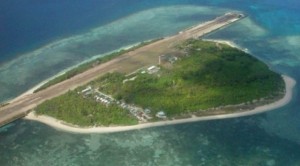US presses Beijing on South China Sea claims
WASHINGTON—The United States on Wednesday urged China to clarify or adjust its claims in the South China Sea (West Philippines Sea), calling for a peaceful solution to one of Asia’s growing flash points.
With tensions already high over China’s imposition of an air zone above islands administered by Japan in the East China Sea, fears are growing of a fresh showdown in a separate row in the South China Sea where the Philippines is especially concerned.
Dealing with the rifts, the top US diplomat for the region challenged Beijing’s “nine-dash line” that outlined its territorial claims over much of the South China Sea.
The nine-dash line takes in 90 percent of the 3.5-kilometer South China Sea on Chinese maps.
China, the Philippines, Vietnam, Taiwan, Malaysia and Brunei all have territorial claims across the waterway that provides 10 percent of the global fisheries catch and carries $5 trillion in ship-borne trade.
In congressional testimony, US Assistant Secretary of State for East Asian and Pacific Affairs Danny Russel said China’s vague territorial claims in the South China Sea had “created uncertainty, insecurity and instability” among its neighbors.
While the United States says it does not take sides in disputes, Russel said it had an interest in seeing maritime disputes resolved peacefully.
The United States has also stepped up its military presence in the region as part of a strategic “pivot” toward Asia.
“There are growing concerns that this pattern of behavior in the South China Sea reflects incremental effort by China to assert control over the area contained in the so-called nine-dash line despite objections of its neighbors and despite the lack of explanation or apparent basis under international law regarding the scope of the claim itself,” Russel told the House of Representatives subcommittee on Asia and the Pacific.
Land features
Russel said that maritime claims under international law needed to be based on land features.
“Any Chinese claim to maritime rights not based on claimed land features would be inconsistent with international law,” Russel said.
“China could highlight its respect for international law by clarifying or adjusting its claim to bring it into accordance with international law of the sea,” he said.
Russel supported the Philippines’ right to take its case to a United Nations tribunal for arbitration, a move last year that was denounced by China as part of efforts to find a “peaceful, noncoercive” solution.
“China’s lack of clarity with regard to its South China Sea claims has created uncertainty in the region and limits the prospect for achieving mutually agreeable resolution or equitable joint development arrangements,” Russel said.
Russel’s remarks indicate an increasingly activist US stance on the South China Sea. In 2010, then US Secretary of State Hillary Clinton declared on a visit to Vietnam that freedom of navigation was a US national interest in the South China Sea, through which more than half of the world’s merchant goods are shipped.
But the United States, while boosting military cooperation with allies Japan and the Philippines, has generally stressed that it takes no stance on sovereignty in Asia’s myriad disputes, a position that Russel
reiterated.
Air defense zone
Concerns have been rising over the South China Sea. The Philippines’ President Aquino, in an interview with The New York Times on Tuesday, called on world leaders not to “appease” China and drew a parallel to the 1938 decision to give Czechoslovakia’s Sudetenland to Adolf Hitler’s Germany.
Japan’s Asahi Shimbun recently reported that China had drafted proposals for an air defense identification zone over the South China Sea, similar to a move last November over the East China Sea that sent tensions soaring with Tokyo.
China denied the report, accusing “right-wing forces” in Japan of playing up tensions.
The state-run Xinhua news agency separately attacked Aquino, saying his remarks showed him to be an “amateurish politician who was ignorant both of history and reality.”
The Philippines’ Department of Foreign Affairs (DFA), however, reiterated on Thursday Aquino’s call for the nations of the world to do more to support the Philippines in resisting China’s assertive claims to territory within Manila’s 370-kilometer exclusive economic zone.
The DFA also reiterated the Philippine position that China’s nine-dash line claim in the West Philippine Sea—parts of the South China within Manila’s 370-km exclusive economic zone—was in violation of international law.
“Expansionism in the form of the nine-dash line in the South China Sea is in gross violation of the rule of law and threatens peace and stability. This expansionism is being driven by might and not by what is right,” said DFA spokesman Raul Hernandez.
Warning to China
Russel repeated warnings to China not to impose an air defense identification zone, which calls on planes to report to Beijing, over the South China Sea.
“We neither recognize nor accept China’s declared [air defense identification zone],” Russel said.
“We made clear to China that it shouldn’t attempt to implement that [air defense zone] and should refrain from taking similar actions elsewhere in the region,” he added.
The United States, Japan and South Korea have defied China’s zone in the East China Sea by flying fighter jets through it without informing Beijing.
But Rep. Steve Chabot, the chair of the House foreign affairs subcommittee on Asia and a member of the rival Republican Party, accused US President Barack Obama’s administration of sending “mixed signals” that had emboldened China.
“It’s time for the administration to move beyond speeches and find a way to reassure the region that the United States is there to stay, and that America’s future in Asia is strong, committed and absolute,” Chabot said.—Reports from AFP and Tarra Quismundo
For comprehensive coverage, in-depth analysis, visit our special page for West Philippine Sea updates. Stay informed with articles, videos, and expert opinions.
